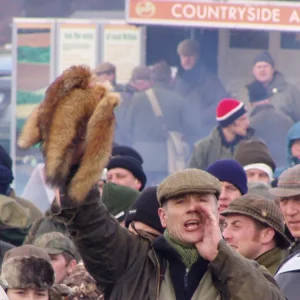
A man who snatched badgers from their sett has been given 200 hours community service and banned from keeping dogs.
Tony Billington, 37, travelled from his home at Eaveswood Close, Bamber Bridge, Preston, Lancashire, to take the animals from a sett near Loggerheads in Staffordshire.
RSPCA officers found a badger carcass, the body of a cub and a trail of blood across a field in January 2004.
Billington, who could have been jailed, was also fined £1,000 for badger digging by Cannock magistrates.
The crime involves widening the opening of a sett and sending dogs such as terriers in to flush out the badgers.
Posted: 14 March 2006
Soham techniques snare badger fiend
Animal welfare campaigners have told how forensic techniques used in the Soham murder trials helped convict a man of badger baiting.
Tony Billington, 37, of Eveswood Close, Bamber Bridge, Preston, was found guilty of snatching badgers from a sett at Greatwood Farm, Wetwood, in January last year.
Stafford Magistrates heard how RSPCA officers found a gruesome trail of blood leading from the sett, and 12 holes where someone had been digging.
But although his vehicle had been spotted at the scene, RSPCA officers struggled to find the evidence to connect Billington to the baiting, until experts were called in.
Pat Wiltshire, who worked on the Soham case, helped match pollen from the fields to traces found on one of Billington’s spades, while founder of the Staffordshire Rural Policing Unit, Faye Burton, identified badger hair left on tools.
Ian Briggs, from the RSPCA’s special operations unit, said: “Police searched his home and found two spades covered in soil. One had hair on it and there were rags with blood stains on them.
“It’s difficult to get these cases to court, never mind get them convicted. In the samples we got from the spades there was some pollen and soil.
“We called Pat Wiltshire to do a report on the pollen. Her evidence helped connect Billington to this incident.”
But identifying the badger hair proved more difficult. Luckily, Ian’s work had brought him in to contact with local wildlife activist and badger expert Faye Burton.
Faye had already helped the RSPCA make massive leaps in their ability to get prosecutions by championing a portable DNA kit that can be used at the scene of the crime. The kits allow officers to identify animal products in minutes rather than days.
Faye said: “They found what they thought was badger hair on the spade, but, of course, they didn’t know. Someone working on the case asked if anyone was able to identify a badger hair, and Ian put them on to me.
“They brought it out to me and I put together a three-page report which they could use as a statement. Everything I said was backed up with the DNA tests.
“They said the case wasn’t going anywhere, but when the solicitor saw my statement it really took off. The officers also used the DNA kit which I launched.
“It was a real team effort and it came off. We need to get the message out there that these people can’t get away with this sort of thing.”
Those involved in the case are confident that the forensic techniques can be used again and again to bring more criminals to justice.
Mr Briggs said: “We’re really pleased about the result. If it wasn’t for the forensic techniques the case would not have come this far.
“In the past it’s always been difficult t prosecute because you pretty much had to catch people in the act, but now, using DNA evidence, we can still find them. It was a brilliant result.”
Billington is due to be sentenced at Cannock Magistrates Court on Tuesday, March 14.
More Information: Tony Billington Convicted After Racist Outburst



